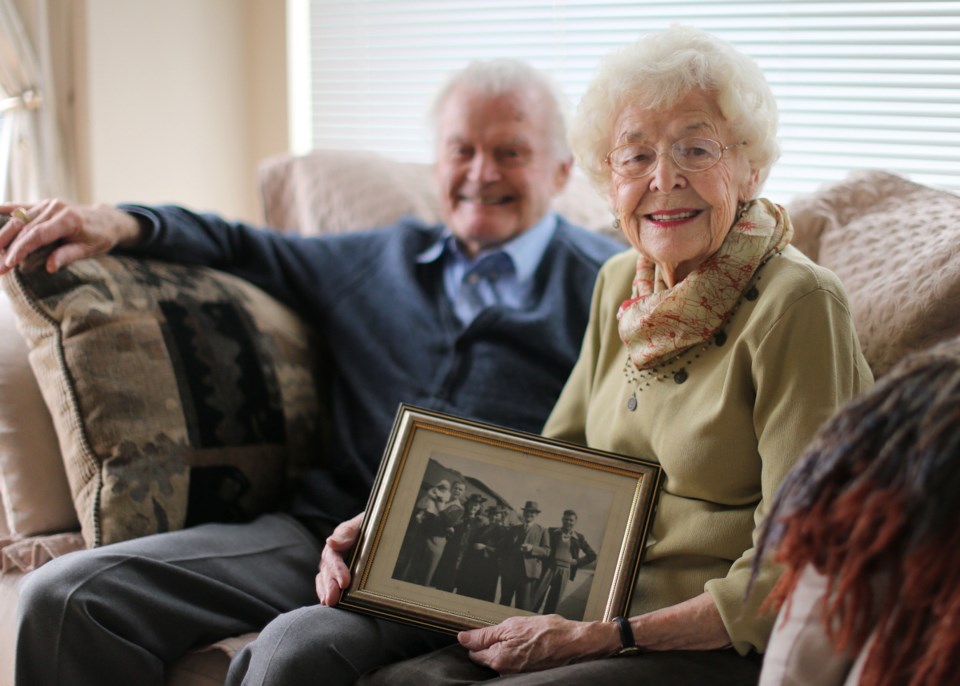“I couldn’t have imagined it,” said Welsh-born Hilda, 88, in the Langford home she shares with husband Lew, 95. “The size of it all was just immense.”
It was June, 19, 1946 and the then 21-year-old had spent all her life in the port city of Swansea, Wales.
Hilda had also endured six years of wartime. Food and clothing were rationed. Her family home had been destroyed in a bomb attack. And she had met Lew, a handsome Canadian bomber pilot and squadron leader.
Lew was so quickly smitten, he proposed within weeks of their first meeting. Hilda was so hesitant, she gave him his ring back three times and took weeks to mount the courage to tell her mother.
But Hilda and Lew were married, on April 2, 1945, six months after their first meeting on a train, which had been delayed by a bomb attack.
In the few months following their marriage, Hilda became pregnant. Germany would surrender on May 7, 1945. And Lew would be shipped back to Canada to train for an attack on Japan.
It wasn’t until after Japan had surrendered on Aug. 15, 1945, that Hilda could make plans to join Lew in Canada, and even then, only after their daughter was born.
When the two were reunited in Saskatchewan, Hilda hadn’t seen Lew for a year. And Lew had not laid eyes in his new daughter, then four months old.
Hilda will be at the Fairmont Empress hotel April 12 to 14 for a war brides reunion, organized by the Canadian War Brides and Families Association.
Those who attend will be welcomed by Lt.-Gov. Judith Guichon and serenaded by the Naden Band. It is not known how many war brides will attend (organizers are expecting at least 100) or how many are still alive.
But the ones who come will be among the last living of the 48,000 women (and 22,000 children) who came to Canada after weddings to Canadian servicemen during the Second World War.
Realizing their large numbers, the Canadian government stepped in to help. Passage for troop ships was paid. (Hilda came on the converted SS Queen Mary, landing in Halifax.)
There were also special trains across Canada, with frequent stops to drop off war brides and their children to new homes.
In the U.K. during their courtship, perhaps because he was so smitten, Lew failed to mention Saskat-chewan’s flatness. Nor had he mentioned Prairie winters. Ditto for the lack of paved streets in Hanley. And he said nothing of the lack of indoor toilets or running water.
In fact, Hilda’s first clue of the world into which she was moving was on the train full of new brides. As the train pulled along, women would pester conductors and waiters for details about their homes to be.
“So I asked the conductor, ‘What’s Hanley like,’ ” she remembers.
“He said, ‘Oh, I know Hanley. You see that table top? Well, Hanley is just as flat and it has just as many trees on it,’ ” Hilda said.
“After that, you kind of wonder what you’re getting into,” she said.
Hilda remembers being terribly homesick at times and even said goodbye to a few other war brides who left to go back to the U.K.
But in 1949, Lew fulfilled a promise and borrowed money for Hilda and the couple’s two kids to visit Swansea.
“I was there for about three months and you know, I couldn’t wait to get back again,” Hilda said.
Back in Saskatchewan, Hilda and Lew continued to produce babies. The couple now have four grown children, six grandchildren and four great-grandchildren.
As the years went by, Lew made his living selling farm machinery. But he would continue to fly. He rejoined the air force and trained other pilots. He even bought his own plane.
In the late 1950s, he purchased what he says was the first privately owned helicopter in Saskatchewan. He and Hilda would travel to events such as the Saskatoon Fair and offer plane rides, Lew piloting and Hilda selling tickets.
Lew also became mayor of Hanley in 1956 and during his term helped bring sewers and water to the community.
Finally, after he retired in 1981, Hilda pulled in another promise. Lew had always said when the time came, the two would move to a place like Wales. They arrived in Sidney in 1982 and have loved Vancouver Island ever since.
Looking back, Lew credits the wartime experiences of the war brides for their endurance in Canada. They had been bombed, evacuated and many had lost friends and family. Therefore, they were able to cope with a place like Hanley in a way many Canadian women might not.
“I remember somebody over there asked me, ‘Are you Canadians all crazy?’ ” recalled Lew. “He said, ‘You’re all over here getting married by the thousands, so what’s going on?’
“He didn’t seem to understand, we were all of a marriageable age and these were a new breed of girls that we were meeting,” he said. “These were the ones that made it, putting up with a lot of real war.”



